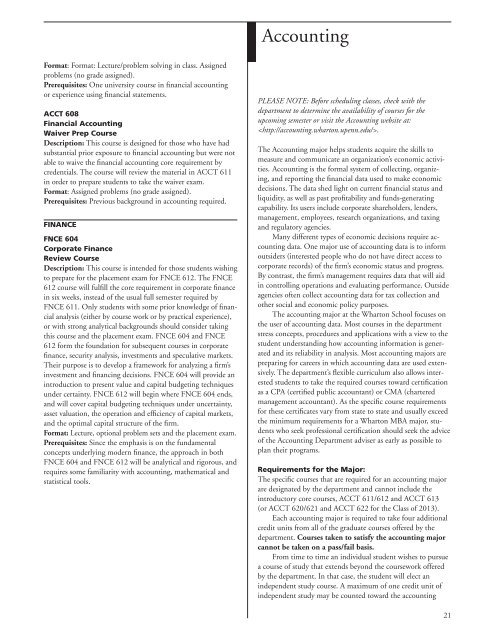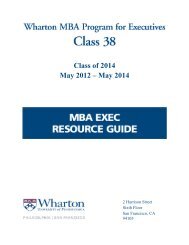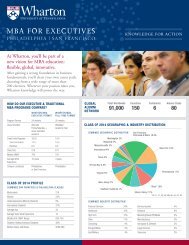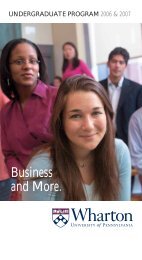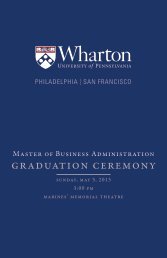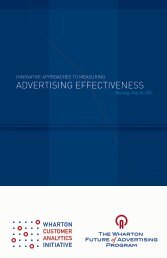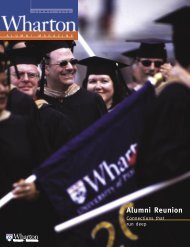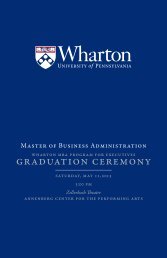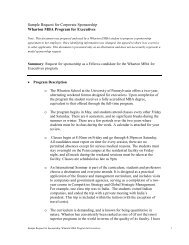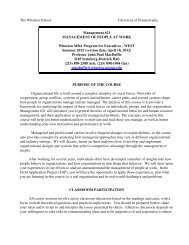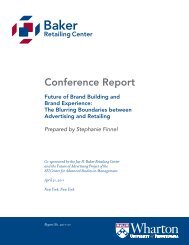Explore Options; Plan Your MBA Academic Program
Explore Options; Plan Your MBA Academic Program
Explore Options; Plan Your MBA Academic Program
Create successful ePaper yourself
Turn your PDF publications into a flip-book with our unique Google optimized e-Paper software.
Format: Format: Lecture/problem solving in class . Assigned<br />
problems (no grade assigned) .<br />
Prerequisites: One university course in financial accounting<br />
or experience using financial statements .<br />
ACCT 608<br />
Financial Accounting<br />
Waiver Prep Course<br />
Description: This course is designed for those who have had<br />
substantial prior exposure to financial accounting but were not<br />
able to waive the financial accounting core requirement by<br />
credentials . The course will review the material in ACCT 611<br />
in order to prepare students to take the waiver exam .<br />
Format: Assigned problems (no grade assigned) .<br />
Prerequisites: Previous background in accounting required .<br />
FINANCE<br />
FNCE 604<br />
Corporate Finance<br />
Review Course<br />
Description: This course is intended for those students wishing<br />
to prepare for the placement exam for FNCE 612 . The FNCE<br />
612 course will fulfill the core requirement in corporate finance<br />
in six weeks, instead of the usual full semester required by<br />
FNCE 611 . Only students with some prior knowledge of financial<br />
analysis (either by course work or by practical experience),<br />
or with strong analytical backgrounds should consider taking<br />
this course and the placement exam . FNCE 604 and FNCE<br />
612 form the foundation for subsequent courses in corporate<br />
finance, security analysis, investments and speculative markets .<br />
Their purpose is to develop a framework for analyzing a firm’s<br />
investment and financing decisions . FNCE 604 will provide an<br />
introduction to present value and capital budgeting techniques<br />
under certainty . FNCE 612 will begin where FNCE 604 ends,<br />
and will cover capital budgeting techniques under uncertainty,<br />
asset valuation, the operation and efficiency of capital markets,<br />
and the optimal capital structure of the firm .<br />
Format: Lecture, optional problem sets and the placement exam .<br />
Prerequisites: Since the emphasis is on the fundamental<br />
concepts underlying modern finance, the approach in both<br />
FNCE 604 and FNCE 612 will be analytical and rigorous, and<br />
requires some familiarity with accounting, mathematical and<br />
statistical tools .<br />
Accounting<br />
Please note: Before scheduling classes, check with the<br />
department to determine the availability of courses for the<br />
upcoming semester or visit the accounting website at:<br />
.<br />
The Accounting major helps students acquire the skills to<br />
measure and communicate an organization’s economic activities<br />
. Accounting is the formal system of collecting, organizing,<br />
and reporting the financial data used to make economic<br />
decisions . The data shed light on current financial status and<br />
liquidity, as well as past profitability and funds-generating<br />
capability . Its users include corporate shareholders, lenders,<br />
management, employees, research organizations, and taxing<br />
and regulatory agencies .<br />
Many different types of economic decisions require accounting<br />
data . One major use of accounting data is to inform<br />
outsiders (interested people who do not have direct access to<br />
corporate records) of the firm’s economic status and progress .<br />
By contrast, the firm’s management requires data that will aid<br />
in controlling operations and evaluating performance . Outside<br />
agencies often collect accounting data for tax collection and<br />
other social and economic policy purposes .<br />
The accounting major at the Wharton School focuses on<br />
the user of accounting data . Most courses in the department<br />
stress concepts, procedures and applications with a view to the<br />
student understanding how accounting information is generated<br />
and its reliability in analysis . Most accounting majors are<br />
preparing for careers in which accounting data are used extensively<br />
. The department’s flexible curriculum also allows interested<br />
students to take the required courses toward certification<br />
as a CPA (certified public accountant) or CMA (chartered<br />
management accountant) . As the specific course requirements<br />
for these certificates vary from state to state and usually exceed<br />
the minimum requirements for a Wharton <strong>MBA</strong> major, students<br />
who seek professional certification should seek the advice<br />
of the Accounting Department adviser as early as possible to<br />
plan their programs .<br />
Requirements for the Major:<br />
The specific courses that are required for an accounting major<br />
are designated by the department and cannot include the<br />
introductory core courses, ACCT 611/612 and ACCT 613<br />
(or ACCT 620/621 and ACCT 622 for the Class of 2013) .<br />
Each accounting major is required to take four additional<br />
credit units from all of the graduate courses offered by the<br />
department . Courses taken to satisfy the accounting major<br />
cannot be taken on a pass/fail basis.<br />
From time to time an individual student wishes to pursue<br />
a course of study that extends beyond the coursework offered<br />
by the department . In that case, the student will elect an<br />
independent study course . A maximum of one credit unit of<br />
independent study may be counted toward the accounting<br />
21


